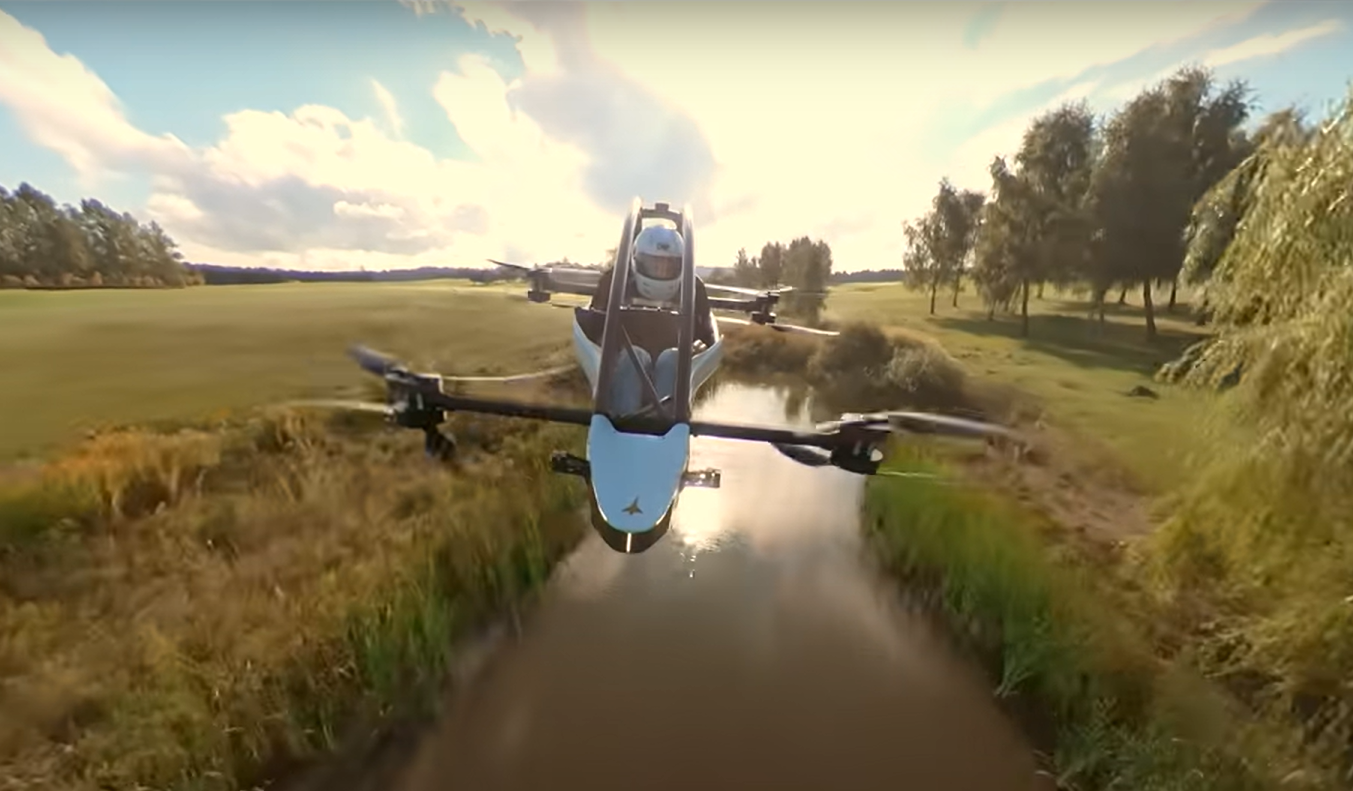Introducing Jetson One – the personal jetpack that can fly faster than a car
Aviation enthusiasts, buckle up: The future of personal flight is not on the distant horizon—it’s virtually knocking at our doors.

[Nov. 6, 2023: Staff Writer, The Brighter Side of News]
Aviation enthusiasts, buckle up: The future of personal flight is not on the distant horizon—it's virtually knocking at our doors. (CREDIT: Jetson)
Aviation enthusiasts, buckle up: The future of personal flight is not on the distant horizon—it's virtually knocking at our doors. A groundbreaking jetpack called Jetson ONE has recently carved the skies of the United States with its maiden voyage, paving the way for the public to take the helm by as early as 2024.
This isn't science fiction; it's the brainchild of an Italy-based aeronautics company that has attracted an impressive $15 million in funding. Among the investors is the celebrated artist and tech visionary, will.i.am, indicating a cross-pollination of entertainment and innovation.
The Jetson ONE has stirred up quite a tempest, with 300 eager customers already lined up for their own personal aircraft, each staking $98,000 to claim a slice of the sky. But what exactly does the Jetson ONE bring to the table, or rather, to the clouds?
Jetson ONE - first flight in the US. (CREDIT: Jetson)
With the capability to hit a maximum velocity of 63 miles per hour and ascend to an altitude of 1,500 feet, the Jetson ONE is no laggard in performance. Its powerplant? Eight robust electric motors, each twinned with its own battery pack, driving eight propellers to cut through the air. This ensemble orchestrates roughly 20 minutes of flight time before the need for recharging arises—a remarkable feat for electric aviation.
The craft's design team has pulled off an engineering marvel: keeping the total weight below 200 pounds. Why is this significant? It earns the Jetson ONE the title of an “ultralight” aircraft, a designation that slips it from the tight grasp of Federal Aviation Administration's stringent regulations that govern other burgeoning flying car technologies.
Related Stories
Herein lies the game changer: The Jetson ONE's classification opens a skyward path with fewer bureaucratic hurdles. Prospective pilots can indulge in their airborne aspirations without the need for a license, bypassing the rigorous testing and certification that traditional amateur pilots must undergo.
Imagine a craft that echoes the thrill of a jetski, yet breaks the bonds of gravity. It's this very allure that Jetson ONE offers—a machine that not only elevates you literally but does so with an accessible, almost plug-and-play ease.
"We envision a future where the sky is peppered with Jetson ONEs, much like roads are filled with cars today," proclaimed Stéphan D’haene, the CEO of Jetson, in an interview with Axios. The company's driving force is to make the skies available to everyone—a democratization of flight where the clouds are no longer exclusive to the birds and the behemoth commercial jets.
The learning curve for piloting this aerial marvel is astonishingly gentle. D’haene confidently asserts that the mastery of the Jetson ONE's controls can be achieved in "about five hours." Once the initial learning is complete, pilots can navigate using "intuitive joystick controls," while the onboard flight computer manages the complex aerodynamic calculations, leaving pilots to enjoy the art of flight.
Safety is not an afterthought with the Jetson ONE. Amidst the thrills and the liberating experience it promises, the company has conscientiously equipped the jetpack with a "ballistic parachute," a failsafe for those unforeseen moments when contingencies become realities.
In the photo from left to right: Timothy Wheeler, Tomasz Patan, Rikard Steiber, Luca Spada, Anna Kwasniewska, and Nicolo Broggini. (CREDIT: Jetson)
"Our mission at Jetson is to democratize flight and make the skies available to everyone," D’haene reiterated, encapsulating the company's ethos. It's a vision that transforms the sky from an exclusive highway for the seasoned few into a bustling avenue where personal flight becomes as commonplace as a morning commute.
As Jetson ONE sets its propellers for customer deliveries in 2024, the implications for transport, recreation, and aviation regulations are sky-high. This isn't just about a new gadget hitting the market—it's a potential paradigm shift in how we perceive travel, distance, and freedom.
Aviation enthusiasts, buckle up: The future of personal flight is not on the distant horizon—it's virtually knocking at our doors. (CREDIT: Jetson)
The ripple effect of such innovation cannot be understated. With urban landscapes becoming increasingly congested, the Jetson ONE offers a fresh perspective—literally. It's an alternative route that takes commuters off the ground and into the air, a concept that urban planners, regulators, and the environmentally conscious are watching closely.
As we stand on the precipice of this new era in aviation, questions naturally soar. How will our cities adapt to the rise of personal flight devices? What does this mean for current air traffic control systems? Will our skies become the new highways of the 21st century? The Jetson ONE might just be the catalyst that compels us to find these answers sooner rather than later.
For now, the Jetson ONE remains an object of desire for those 300 individuals who've secured their pre-orders, a testament to the human yearning for flight. For the rest of us, we look skyward, where the hum of electric propellers heralds the dawn of a new chapter in personal mobility—one that promises to make the skies not a limit, but a playground for innovation and freedom.
For more science news stories check out our New Innovations section at The Brighter Side of News.
Note: Materials provided above by The Brighter Side of News. Content may be edited for style and length.
Like these kind of feel good stories? Get the Brighter Side of News' newsletter.
Joseph Shavit
Head Science News Writer | Communicating Innovation & Discovery
Based in Los Angeles, Joseph Shavit is an accomplished science journalist, head science news writer and co-founder at The Brighter Side of News, where he translates cutting-edge discoveries into compelling stories for a broad audience. With a strong background spanning science, business, product management, media leadership, and entrepreneurship, Joseph brings a unique perspective to science communication. His expertise allows him to uncover the intersection of technological advancements and market potential, shedding light on how groundbreaking research evolves into transformative products and industries.



